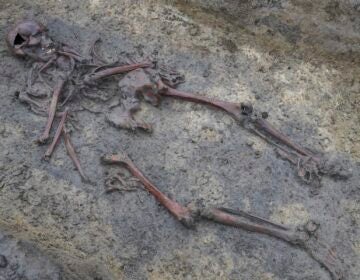The Night ‘Baby Doc’ returned to Haiti
WHYY reporter Susan Phillips has returned to Haiti one year after the earthquake leveled the country. Read her latest blog here about the night the exiled former dictator Jean-Claude ‘Baby Doc’ Duvalier returned to Haiti.
One thing everyone in Haiti will tell you is: Anything can happen at anytime. And on Sunday night, even the most hardened ex-pats seemed stunned to learn that the deposed dictator Jean-Claude Duvalier was on an Air France plane heading to Port-au-Prince. I was about 50 miles northwest of the city, in a rural town called Cange. The town itself did not stretch far from the main road — a road that was under construction thanks to the European Union. Cange is the kind of place where you see a man riding a donkey, while talking on a cell phone. A place where it’s not unusual for eight people to live in two rooms, sleeping on dirt floors under tin roofs, cooking on open fires, while at the same time, taking care to dress their little girls in pressed, white lace and bows for Sunday morning church. It’s the kind of place where 50 years after a dam was built on the river that runs the length of their town — they finally got electricity. This is where a normally exhuberant 25-year-old mental healthcare worker spoke to me about the anxiety she still suffers one year after waking up to find her left leg gone. Three floors of concrete had collapsed on top of her during the earthquake but she still managed to claw her way out. Someone dragged her into the street, and two days later, a priest picked her up and took her to a hospital in Cange. That’s where she woke up, a week later, without a leg. Today, she counsels others who have lost their limbs, assuring them that life does not end with amputation. But mental healthcare, as we know it, is a new phenomenon in Haiti, where young health workers like she struggle with the stigma of having lost a limb, as well as the lack of mental health services. That’s changing, because of the massive devastation of an earthquake that traumatized an entire nation. Just as She-love was deep into an emotional recounting of her tale, word came that the former dictator Baby Doc was on his way home after 25 years in exile. He had been kicked out of the country after 15 years of brutality, imposed upon the population by armed thugs. Baby Doc was just 19 when he inherited his position from his father — Papa Doc – who by some accounts was worse than his playboy son, who liked to play with toy train sets, donning an engineer’s cap, well into adulthood. So instead of staying the night in Cange, my tattooed fixer from suburban Akron, Ohio, along with his shy, orphaned Haitian friend John, and Sperlif, the charming ten-year-old resident of the tent city near the airport headed out on the dark, but newly paved road to Port-au-Prince. As we drove through small towns, residents huddled around radios and televisions. About halfway to the capitol, we came across our first roadblock and were waved through. But the second and third road blocks in the city had us pull over and show identification. Once we got to the Karibe Hotel, where Baby Doc was staying, it was almost midnight. He was having dinner in the restaurant with his old pals, and his wife – or girlfriend — no one was quite sure. As soon as he and his entourage got up to go to their rooms, he was surrounded by security. And in my attempt to take a decent photo and ask a few questions, I found myself pressed shoulder to shoulder with the dreaded dictator. But true to Haiti, he wasn’t at all what I expected. He lacked the heft and pomposity of a strongman. The two of us inched along, scrunched together by the throng of clicking cameras, and scribbling journalists. He seemed dazed, made no eye contact, and had an eary calmness about him. Was he a shadow of his former self? Had he been zombified? Or, had others always run the show? Close to the elevators he patted the head of young Sperlif, and headed up to his room. With no where else to sleep, I camped out on the luxurious couches near the Karibe’s pool. The next morning a hoard of journalist pressed against the gates of the lobby waiting for the anticipated press conference that never came. Instead, his friend and former ambassador to France, the bombastic Henry Robert Sterlin, spoke. When he came inside the hotel I asked him why his pal had returned. “I don’t know what is in his heart that made him return,” said Sterlin. When will he leave? “I don’t know how long he will stay,” he said. And, how is he permitted to remain? “As a former President he is entitled to a diplomatic passport,” answered Sterlin. Throughout the day, Baby Doc’s aged school friends hobbled into the lobby to say hello, while fit, middle-aged women in tennis whites carried rackets out to the courts behind the swimming pool. A Canadian who heads up a security firm in the country told me one theory circulating among Haitians was that the current President Rene Preval orchestrated Baby Doc’s return so that Preval, who is coming to the end of his term without a successor, would appear as a stabilizing force to the western world. Others speculated that another deposed leader — the leftist catholic priest Jean Bertrand Aristide would also return. But by the end of the day, uncertainty remained. And the streets of Port-au-Prince teemed with pedestrians, who spill over from narrow or non-existent sidewalks, dodging careening vehicles blasting black smoke from their exhaust pipes, carrying sacks of rice or water on their heads, sharing the road with peddlers of all sorts, trying to eek out some kind of living not too far from the safe-to-drink ice cubes of the Karibe.
WHYY is your source for fact-based, in-depth journalism and information. As a nonprofit organization, we rely on financial support from readers like you. Please give today.




